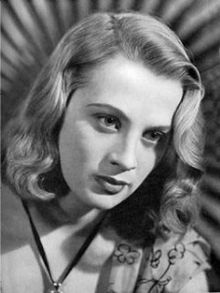- Mai Zetterling
-
Mai Zetterling 
Born Mai Elisabeth Zetterling
24 May 1925
Västerås, Västmanland, SwedenDied 17 March 1994 (aged 68)
London, England, U.K.Occupation Actress, film director Spouse Tutte Lemkow (1944–1953) (divorced)
David Hughes (1958–1979) (divorced)Mai Elisabeth Zetterling (Swedish pronunciation: [mâjː sɛ̂tːəɭɪ̂ŋ]; 24 May 1925 – 17 March 1994)[1] was a Swedish actress and film director.
Contents
Early life
Zetterling was born in Västerås, Västmanland, Sweden to a working class family.[2] She started her career as an actress by the age of seventeen at Dramaten, the Swedish national theater, and appeared in war-era film starting in her teens.
Career
Zetterling appeared in film and television productions spanning six decades from the 1940s to the 1990s. Her breakthrough came in the 1944 film Torment written by Ingmar Bergman, in which she played a controversial role as a tormented shopgirl. Shortly afterwards she moved to England and gained instant success there with her title role in Basil Dearden's Frieda (1947) playing opposite David Farrar. After a brief return to Sweden in which she worked with Bergman again in his film Music in Darkness (1948), she returned to England and starred in a number of English films, playing against such leading men as Tyrone Power, Dirk Bogarde, Richard Widmark, Laurence Harvey, Peter Sellers, Herbert Lom, Richard Attenborough, Keenan Wynn, Stanley Baker, and Dennis Price.
Some of her notable films as an actress include Quartet (1948), a film based on some of W. Somerset Maugham's short stories, The Romantic Age (1949) directed by Edmond T. Gréville, Only Two Can Play (1962) co-starring Peter Sellers and directed by Sidney Gilliat, and The Witches (1990), an adaptation of Roald Dahl's book directed by Nicholas Roeg. Having gained a reputation as a sex symbol in dramas and thrillers, she was equally effective in comedies, and also was very active in British television in the '50s and '60s.
She began directing in the early 1960s, starting with political documentaries and a short film called The War Game (1962), which was nominated for a BAFTA award. Her first feature film Älskande par (1964, "Loving Couples"), was banned at the Cannes Film Festival for its sexual explicitness and nudity. Kenneth Tynan of The Observer later called it "one of the most ambitious debuts since Citizen Kane." It was not the only film she made which would stir up controversy for its frank sexuality.
When critics reviewing her debut feature said that "Mai Zetterling directs like a man,"[3] she began to explore feminist themes more explicitly in her work. The Girls, which had an all-star Swedish cast including Bibi Andersson and Harriet Andersson, discussed women's liberation (or lack thereof) in a society controlled by men, as the protagonists compare their lives to characters in the play Lysistrata, and find that things have not progressed very much for women since ancient times.
Personal life
In 1985 she published an autobiography, All Those Tomorrows.[4] She died in London, England, from cancer on St. Patrick's Day in 1994, at the age of 68. Recently released documents at the National Archives in London show that she, a member of the Hollywood Left, was watched by British security agents as a suspected Communist. However, the UK never had a system along the lines of the American Hollywood Blacklist.
Filmography
A partial filmography as director:
- The War Game (1962)
- Älskande par (1964, "Loving Couples") – banned at the Cannes Film Festival.
- Nattlek (1966, "Night Games") – banned at the Venice Film Festival.
- Doctor Glas (1968)
- Flickorna (1968, "The Girls") – a feminist rumination on Aristophanes' classical antiwar play Lysistrata, with Bibi Andersson, Harriet Andersson and Gunnel Lindblom
- Visions of Eight (1973) – segment "The Strongest".
- Månen är en grön ost (1977)
- Love (1982) – segments "Love From the Market Place", "The Black Cat in the Black Mouse Socks", and "Julia".
- Scrubbers (1983)
- Amorosa (1986)
- Sunday Pursuit (1990)
Actress
- Prince Gustaf (1944)
- Torment (1946)
- Sunshine Follows Rain (1946)
- Iris and the Lieutenant (1946)
- Frieda (1947)
- Life Starts Now (1948)
- Music in Darkness (1948)
- Portrait from Life (1948)
- Quartet (1948)
- The Romantic Age (1949)
- The Bad Lord Byron (1949)
- The Lost People (1949)
- Blackmailed (1951)
- Hell is Sold Out (1951)
- The Ringer (1952)
- Desperate Moment (1953)
- Knock on Wood (1954)
- Dance, Little Lady (1954)
- A Prize of Gold (1955)
- Ett Dockhem (1956)
- Abandon Ship (1957)
- The Truth About Women (1957)
- Jet Storm (1959)
- Faces in the Dark (1960)
- Piccadilly Third Stop (1960)
- Offbeat (1961)
- The Devil Inside (1961)
- Only Two Can Play (1962)
- The Main Attraction (1962)
- Operation Mermaid (1963)
- The Man Who Finally Died (1963)
- The Vine Bridge (1965)
- Hidden Agenda) (1990)
- The Witches (1990)
- Mofars Resa (1993)
References
- ^ DEATHS - The Washington Post - HighBeam Research
- ^ Collins, Glenn (March 19, 1994). "Mai Zetterling, 68, Film Actress With a Second Career in Directing". The New York Times. http://query.nytimes.com/gst/fullpage.html?res=9A06E7DD173CF93AA25750C0A962958260. Retrieved May 12, 2010.
- ^ http://www.tcm.com/tcmdb/participant.jsp?spid=212401
- ^ Mai Zetterling (1985). All Those Tomorrows. London: Cape. ISBN 0224018418. New York: Grove, 1986. ISBN 0-394-55602-X.
External links
- Mai Zetterling at the Internet Movie Database
- Mai Zetterling at the Swedish Film Database
- Mai Zetterling at the British Film Institute's Screenonline
- Mai Zetterling at Turner Classic Movies
- Mai Zetterling at Nationalencyklopedins Internettjänst
Categories:- 1925 births
- 1994 deaths
- People from Västerås
- Female film directors
- Swedish film actors
- Swedish film directors
- Cancer deaths in England
Wikimedia Foundation. 2010.
